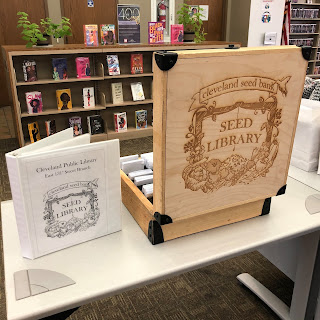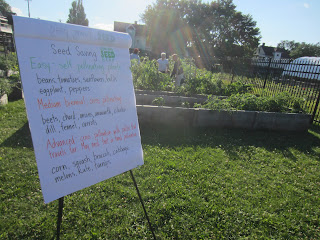Local nonprofit Cleveland Seed Bank plants real ‘seeds of change’
By Elaine Cicora
 The Cleveland Chapter of Les Dames d’Escoffier International is pleased to announce that local nonprofit, The Cleveland Seed Bank, is the 2022 recipient of our Green Tables Initiative Grant.
The Cleveland Chapter of Les Dames d’Escoffier International is pleased to announce that local nonprofit, The Cleveland Seed Bank, is the 2022 recipient of our Green Tables Initiative Grant.
The Cleveland Seed Bank is the domestic work of The Hummingbird Project, an international nonprofit based in Cleveland, Ohio. It aims to safeguard and restore the biological diversity vital for sustainable agriculture, both in the U.S. and around the world.
“The Cleveland Les Dames chapter feels strongly about supporting organizations such as this, that benefit local foods systems,” says chapter member and grants committee chairperson Carol Hacker. “Connecting and educating members of the local community builds strength in neighborhoods and improves everyone's lives.”
The $2,000 grant will be used to support the Seed Bank’s Climate Change Speaker Series, a monthly series of speaker-led events surrounding the issue of climate change as it relates to food insecurity, healthy eating and our food system. According to Hummingbird Project co-founder and executive director, Marilyn McHugh, the topics have been chosen with a “seed to table” mindset, which will allow participants to confidently prepare home gardens, grow food, know where their food comes from, save adaptable seed, attract local pollinators and minimize waste – thereby helping build a local food system in Northeast Ohio that is more resilient to the effects of climate change.
Thus far, topics in the series have included soil blocking and seed starting, composting, use of organic fertilizers, and a cooking demo featuring “Glorious Greens.”
All workshops are presented in the classroom space at local nonprofit Cleveland Roots – coincidentally, the 2019 recipient of LDEI-Cleveland’s Green Tables grant – and have attracted a multicultural, intergenerational audience of “people who are passionate about local food and knowing where their food comes from,” says Marilyn.
“We wanted to offer subjects that would be engaging and interactive,” she continues. “The fact that the classroom is right next to Cleveland Roots’ greenhouse is a real plus. We can be teaching in the classroom and then walk right next door to the greenhouse and actually show participants just what we have been talking about.”
Founded in 2011 by Marilyn and her husband, Chris Kennedy, the Hummingbird Project and its initiatives have focused on reconnecting people to the natural world and empowering community resilience through ecological regeneration and sustainable practices. Chris is a professional educator and Marilyn is a biologist, soil microbiologist, researcher, avid seed saver and full-time staffer with the National Institutes of Health. Together, Marilyn says, they envision initiatives like the Cleveland Seed Bank and the Speaker Series as providing participants with a set of “actionable skills” for tackling climate change.
In its role to promote locally adapted seeds, the Cleveland Seed Bank operates in partnership with 20 local public libraries, comprising seven public-library systems and three counties. Participants are able to “borrow” seeds from their library, plant them in their gardens, and enjoy their harvests. Then, they save the seeds from their mature plants and may either share them with their community or bring them to the annual Winter Seed Swap, an immensely popular event attracting up to 500 eager participants. The Seed Bank also hosts various plant sales and swaps, including a recent one at a local brewery. “It has been so much fun to build these programs,” says Marilyn. “And now, especially in the wake of COVID, there is so much happiness and joy in being in community again!”
Just how do locally adapted seeds play a role in fighting climate change? Marilyn explains. “Seeds are living embryos,” she says. “Every seed is alive, and the ones we plant in Cleveland and save, year after year, adapt. They have memories of the challenges faced by their ancestors, and they adapt: to our weather, our water and our soil. This is the real solution: for our farmers to grow resilient, adapted seeds, working with Mother Nature and not against her. All that adaptability is right there in the seeds.”
While admitting that the pressures of climate change are no longer theoretical, Marilyn says she holds out hope for effective solutions. “I envision a world that is inspired by nature, where we look to nature to learn how to solve our problems, and so create healthy, resilient, abundant livelihoods. By that, I mean we are not polluting, not damaging our ecosystem, but are enhancing biodiversity and regenerating healthy ecosystems.
“I am hugely optimistic,” she concludes. “Every time I see a seed sprout, it gives me hope.”
The Climate Change Speaker Series is free and open to the public. Go here to find a listing of upcoming workshops and other special events sponsored by The Hummingbird Project. While you’re there, you can sign up for their newsletter, or connect with them on Facebook.
“LDEI’s Green Tables Initiative allows each chapter to support programs in their community that deepen the relationship between locally grown food and what's on our plates,” says Cleveland LDEI chapter president Beth Davis-Noragon. “We are very excited to support the Cleveland Seed Bank and are thrilled that the program aligns with the Initiative literally from a ground-up basis. But it goes much deeper than seeds-in-dirt, by addressing the even bigger picture of climate change through local gardens and their impact on creating more sustainable food systems.
“Not only is it about local food, it’s good food for thought.”



No comments:
Post a Comment